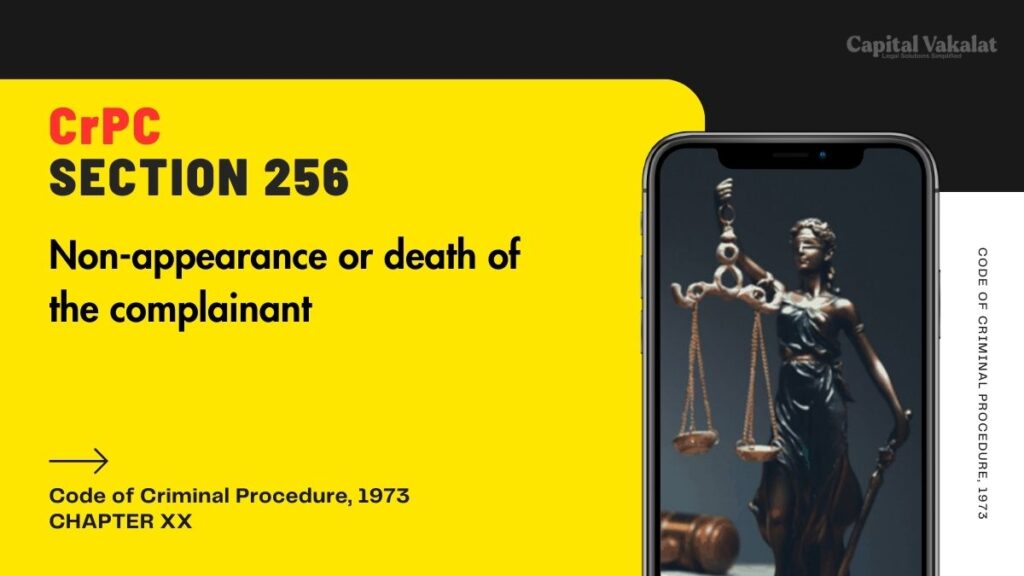Section 256 of the Code of Criminal Procedure (CrPC) holds significant importance in the realm of criminal law. This provision addresses the specific situations where the complainant either does not appear for the hearing or has passed away.

Given the procedural complexities and the implications for both the prosecution and defense, it is crucial to understand the nuances of this section thoroughly.
Bare Act. Section 256 Cr.P.C.
Non-appearance or death of complainant.
(1) If the summons has been issued on complaint, and on the day appointed for the appearance of the accused, or any day subsequent thereto to which the hearing may be adjourned, the complainant does not appear, the Magistrate shall, notwithstanding anything hereinbefore contained, acquit the accused, unless for some reason he thinks it proper to adjourn the hearing of the case to some other day:
Provided that where the complainant is represented by a pleader or by the officer conducting the prosecution or where the Magistrate is of opinion that the personal attendance of the complainant is not necessary, the Magistrate may, dispense with his attendance and proceed with the case.
(2) The provisions of sub-section (1) shall, so far as may be, apply also to cases where the non-appearance of the complainant is due to his death.
What is Section 256 CrPC?
Section 256 CrPC deals explicitly with the scenario where the complainant in a criminal case fails to appear before the court. This provision ensures that the judicial process remains fair and balanced, taking into account the rights of the accused while maintaining the integrity of the legal proceedings.
The Importance of Section 256 CrPC
The application of Section 256 CrPC is critical in maintaining procedural justice. It protects the accused from unnecessary prosecution delays due to the complainant’s non-appearance and provides a clear legal framework for courts to follow in such cases.
Non-Appearance of the Complainant: Legal Implications
When a complainant does not appear, Section 256 CrPC empowers the magistrate to dismiss the complaint unless there is a valid reason for the absence. This dismissal is considered a legal acquittal, meaning the accused is deemed not guilty of the charges.
Death of the Complainant: Procedural Steps
In the unfortunate event of the complainant’s death, the court may continue the proceedings if the cause of action survives. The legal representatives of the deceased complainant can step in to pursue the case, ensuring that justice is not denied due to the complainant’s demise.
Key Provisions and Conditions Under Section 256 CrPC
- Mandatory Presence of Complainant: The section mandates the complainant’s presence unless the magistrate, for valid reasons, decides otherwise.
- Court’s Discretion: The magistrate has the discretion to adjourn the case or proceed with the trial in the complainant’s absence, based on the circumstances.
- Legal Acquittal: If the case is dismissed due to non-appearance, it results in the acquittal of the accused, providing them with relief from the ongoing legal process.
Impact on the Accused: Ensuring Fairness
Section 256 CrPC serves to protect the accused from protracted litigation. It ensures that if the complainant is not diligent in pursuing the case, the accused should not suffer prolonged legal uncertainty.
Exceptions and Special Circumstances
There are certain exceptions to the general rule under Section 256 CrPC. For instance, if the non-appearance is due to unavoidable circumstances, the court may consider these factors and decide accordingly. Additionally, if the complainant provides a reasonable explanation for their absence, the court might adjourn the case rather than dismiss it.
Practical Applications in Legal Proceedings
In practical terms, Section 256 CrPC is frequently invoked in cases involving minor offenses where the complainant’s presence is crucial for the prosecution. Courts often balance the need to expedite justice with the necessity to consider genuine reasons for a complainant’s absence.
Case Studies and Judicial Interpretations
Several landmark judgments have interpreted Section 256 CrPC, providing a robust framework for its application. These cases highlight the judiciary’s approach to balancing the rights of the complainant and the accused, ensuring that justice is served fairly.
Future Implications and Legal Reforms
With the evolving nature of criminal law, there have been discussions about reforming Section 256 CrPC to address contemporary challenges. Proposed changes aim to streamline procedures and enhance the efficiency of legal proceedings while safeguarding the rights of all parties involved.
Common Misconceptions about Section 256 CrPC
Despite its clear provisions, there are common misconceptions about Section 256 CrPC. For instance, some believe that non-appearance automatically leads to the dismissal of the case, overlooking the magistrate’s discretionary power to adjourn.
Role of Legal Practitioners
Legal practitioners play a crucial role in navigating the complexities of Section 256 CrPC. Their expertise ensures that the procedural requirements are met, and the interests of their clients are effectively represented in court.
Conclusion
Understanding Section 256 CrPC is essential for anyone involved in the criminal justice system. It provides a critical mechanism to address non-appearance or death of the complainant, ensuring that the judicial process remains just and equitable. As legal professionals and scholars continue to examine and interpret this provision, its application will evolve to meet the demands of modern justice.